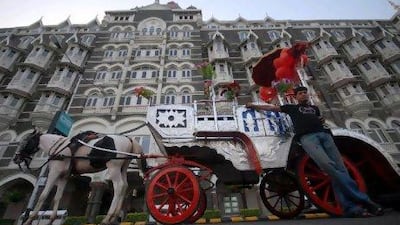Even in one of the hotel's own chauffeur-driven cars, you will be stopped by security at the large closed wrought-iron gates at the entrance to the grounds of the JW Marriott in Mumbai. The luxurious property is enclosed by high walls and electric fences.
After being beckoned through, just a few metres in, several security guards surround the car and rising metal bollards prevent you from driving on. The guards, accompanied by a sniffer dog, open the car's doors, boot and bonnet. They also examine the underside with mirrors. When they are satisfied the car does not pose a threat, the bollards are retracted and you are allowed to proceed up to the hotel.
But security procedures do not end there. Before entering the lobby, you must undergo airport-style security checks. You walk through a detector, you are then body-searched with a hand scanner and all your bags are scanned. Only then can you enter the opulent property.
The security may sound excessive, but it is reassuring, given the fact that two luxury properties in Mumbai, the Taj Mahal Palace and the Oberoi Trident, were targets in the three-day siege on the city in November 2008, in which 166 people were killed.
The Oberoi had to spend US$40 million (Dh146.9m) on renovations, while the Taj spent $50m.
The JW Marriott was not a direct victim of the attacks, but still its business slumped in the months after the terrorist incident. Analysts say the attacks affected the whole country's tourism industry. The global downturn also took its toll on the JW Marriott, known as a popular hangout for Bollywood stars.
But now business is coming back. Occupancy levels have returned to pre-crisis levels at the hotel and rates are gradually picking up.
"Mumbai is a resilient city," says Guy Godet, the general manager of the Mumbai JW Marriott.
Business is doing relatively well, considering that other five-star hotels, including a Westin, have opened in the city.
More are planned for the next year or so including a Sofitel, a Shangri-La and a Radisson Blu. Members of the industry say this is to meet rising demand for luxury properties in India.
There are many signs of the burgeoning middle class, with new apartment buildings coming up and more designer shops. But there are also constant reminders of the country's poverty, with slums scattered around Mumbai and families living by the roadsides in small makeshift tents cobbled together from sticks and plastic sheets.
India's tourism industry is expected to directly contribute $41.98 billion to the country's economy this year, according to the World Travel and Tourism Council.
"I think in luxury it's growing faster than many other places in the world," says Mr Godet. "Demand from India is growing. There are 550 million people in India travelling per year by plane within the country. The economy is very strong.
"When we talk about recession, India was affected simply because the influx of investment was much less. But the economy by itself was so strong, the bank reserves, the fact that we have a large population, and you have an economy within India. There's a lot of exchange between all the states."
Growth from its key international source markets for tourists is also helping, says Chandrashekhar Joshi, the director of sales at the JW Marriott, says the Middle East is the biggest international leisure market for the hotel, accounting for 35 to 40 per cent.
These travellers often stop in Mumbai before heading on to other destinations, such as Goa.
"The Middle East is growing phenomenally," says Mr Godet. "You [the UAE] have a lot of resident Indians who have emigrated a long time back. And basically it's very close to us. When it comes to visiting families we have a lot of incoming people from those sources. There's a lot of alliances There's a lot of commerce between Dubai and India, and both are ports."
Hyatt is another high-profile hotel operator with expansion plans in India.
Marriott has 12 hotels open in India and plans to have 100 properties in its portfolio by 2015. Most of the properties it is opening over the next couple of years are at the luxury end of the market, with a Ritz-Carlton planned for Bangalore and JW Marriott hotels opening in several cities, including Chennai.
"As this economy grows and as India becomes a more familiar destination for leisure as well, and as the Indian travelling public continues to demand higher quality and better services, the need for that hotel stock to grow will be very significant," says Arne Sorenson, the president and chief operating officer of Marriott International.
"India's fast-growing and relatively productive cities will drive a near fourfold increase in India's per capita income between 2008 and 2030," according to a report by McKinsey released this year. "The number of households earning less than 90,000 rupees (Dh7,302) per year is projected to fall below 20 per cent for the first time in India's history."
However, there are still factors holding back growth. Sudeep Jain, the executive vice president of Jones Lang LaSalle in India, says high land costs, bureaucracy and the difficulty of securing attractive debt are deterring developers from building hotels.
"There's still a lot of catching up to do," he says.

